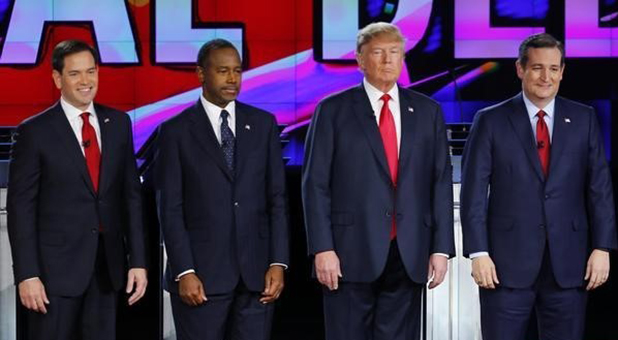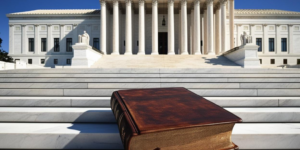What’s the Inside Story of These Latest Polls?
With so many polls being released in the final days before the first votes in the presidential nominating process are cast, it’s often easy just to look at the candidates’ polling numbers and move on.
But the pollsters asked more than one question, and the voters they spoke with took the time from their busy schedules to weigh in. And to experienced political observers, it’s the answers to those other questions that shed a better light on the state of the presidential race.
Three new polls from CBS News and the New York Times, The Des Moines Register and Bloomberg Politics and Public Policy Polling shed light on the current political landscape, which in turn can help predict the direction of the 2016 race.
For instance, the Register‘s Iowa Poll asked likely Republican Caucus voters if they wanted a “disrupter” as the GOP nominee. It found 42 percent of those polled considered that most important in their search for a candidate to support, while 34 percent considered it a minor factor in their decision-making process.
Among the Republican candidates, Donald Trump was viewed overwhelmingly as the candidate most disruptive to politics as usual by a 5-to-1 margin (71-14 percent) in a head-to-head match-up with Ted Cruz. The data noted even Cruz supporters felt that way.
This perhaps explains why so many Cruz supporters have Trump as their second choice and vice versa. Along that same vein, however, the poll asked all of the respondents if their first choice was “anti-establishment.”
More than half—52 percent—said their first choice was “anti-establishment,” which given Cruz and Trump’s placement, shouldn’t come as any surprise. They are seen as “anti-establishment” by 68 and 66 percent of their respective supporters.
The poll also asked likely Iowa Republican Caucus voters whether leadership, issues or “something else” will drive the outcome of the 2016 election. More than half—again, 52 percent—said leadership, while 40 percent said issues.
Cruz is currently leading the Iowa Poll at 25 percent, down about 6 points in one month as he has been hammered in the first-in-the-nation caucus state over his stance on the Renewable Fuel Standard and more recent attacks from Trump about his Canadian birth. Trump is in second at 23 points, well within the poll’s 4.4-point margin of error.
Marco Rubio is in third at 12 percent, while Ben Carson remains in fourth at 11 percent. Rand Paul—who has been left out of the main debate stage for Thursday night’s debate hosted by FOX Business Channel—is in a distant fifth place at 5 percent.
The PPP poll, which is often viewed as slightly biased to the left of center politically, found Trump was leading in Iowa 28-26, also well within the margin of error (4.3 points). Rubio was in third at 13 percent, Carson in fourth at 8 percent, and Jeb Bush in fifth at 6 percent, while all other candidates polled in the low single digits.
That poll delved deeper into the Cruz “birther issue,” and determined it could be problematic for the Texas senator. Nearly a third—32 percent—of likely Republican Caucus voters said “someone born outside the U.S. should not be president.” However, the poll also found only 46 percent of Iowans are aware of Cruz’ birth in Canada.
PPP’s numbers also explain why Trump continues to bring the issue up. Of those who said they support Cruz, 36 percent are unaware he was born outside the U.S., and 24 percent said that should disqualify someone from running for president.
The polling organization also asked voters what was more important: a candidate who is conservative, or a candidate who can win the General Election. Cruz led 38-26 over Trump among those who think being conservative is most important (Carson was in third at 13 percent), while Trump led 31-21 among those who think winning in November is most important (Rubio was third at 18 percent).
Overall, only 57 percent said they were firmly committed to a particular candidate. However, Trump leads among committed voters with 73 percent of his supporters saying they’ve locked in their choice, compared to 58 percent each for Cruz and Paul, and 57 percent for Carson. A majority of every other candidate’s supporters said they were willing to shift their support.
The latest CBS/NYT poll found little has changed nationally at the top of the race with Trump holding a 17-point lead over Cruz (35-19 percent) while Rubio trails behind at 12 percent. Carson, who polled as high as 26 percent in October, however, continues his free fall to the bottom tier, standing at just 6 percent in a tie with Bush for fourth.
No other candidate scored above 4 percent in the poll, which has a margin of error of 6 points.
There is plenty of room for movement, though. The poll found only 35 percent of respondents have firmly made up their mind, which is actually two points lower than in September.
The CBS/NYT poll also asked voters who they expect to see win the GOP nomination, regardless of who they were supporting. Trump was the pick of more than half—53 percent—of those who responded. This was a question the poll began asking in December, when Trump also led with 51 percent.
Cruz was in second in December at just 10 percent, however, that number has since climbed to 17 percent in the latest data.
The poll also asked, if Trump were the GOP nominee, would Republican voters support him. Apparently they will; 80 percent said they would support him enthusiastically (40 percent), with reservations (31 percent), or only because he was the nominee (9 percent).
With Cruz as the nominee: 37 percent enthusiastically, 25 percent with reservations, and 18 percent only because he was the nominee. With Rubio as the nominee: 32 percent enthusiastically, 31 percent with reservations, and 18 percent only because he was the nominee.
So, while it’s easy to look at just the preference polling and say, “There isn’t a lot of change happening, these races are locked up,” the underlying data tells an entirely different story. A lot could—and probably will—happen between now and Feb. 1.






































